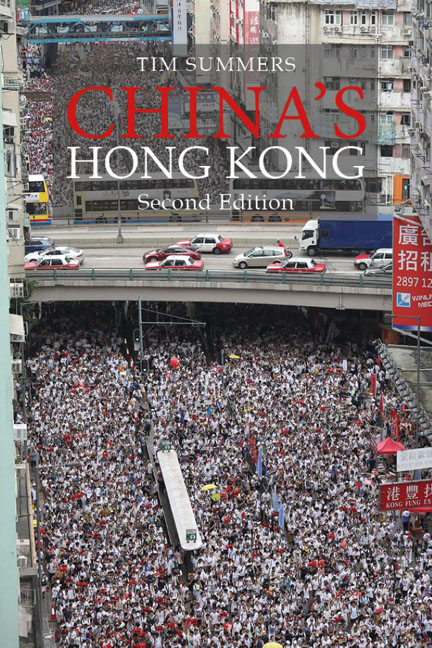Book contents
- Frontmatter
- Contents
- Preface to the second edition
- Note on transliteration
- Glossary and abbreviations
- Map
- Introduction
- 1 Hong Kong before 1997
- 2 Implementing the handover settlement
- 3 Hong Kong’s economy, globalization and the rise of China
- 4 The Occupy movement and its aftermath
- 5 International dimensions of the Hong Kong SAR
- 6 A year of protest
- 7 Hong Kong’s future
- Timeline: Key dates in Hong Kong’s political history
- Notes
- Index
Introduction
Published online by Cambridge University Press: 20 December 2023
- Frontmatter
- Contents
- Preface to the second edition
- Note on transliteration
- Glossary and abbreviations
- Map
- Introduction
- 1 Hong Kong before 1997
- 2 Implementing the handover settlement
- 3 Hong Kong’s economy, globalization and the rise of China
- 4 The Occupy movement and its aftermath
- 5 International dimensions of the Hong Kong SAR
- 6 A year of protest
- 7 Hong Kong’s future
- Timeline: Key dates in Hong Kong’s political history
- Notes
- Index
Summary
In 1997, some 156 years after being taken as part of the spoils of the first Sino-British Opium War, the British colony of Hong Kong was handed over to the People's Republic of China (PRC). What seemed like the closing of the final chapter of the British Empire sparked attention from around the world. For the Chinese leadership and much of the population this was symbolic of their country's gradual return to its historical position as a major power. But for Hong Kong and its people, a somewhat uncertain future lay ahead.
The “handover” followed more than 15 years of Sino-British negotiations, a process which had resulted in commitments that Hong Kong would continue to enjoy the main features of its existing system under Chinese sovereignty. This was the “one country, two systems” framework under which Hong Kong was established as the PRC's first Special Administrative Region (SAR) on 1 July 1997.
After the handover, global interest in Hong Kong waned. That changed in the autumn of 2014, when Hong Kong's “Occupy” movement erupted, with protestors camped out on the streets of Hong Kong's central business district for 79 days, amidst intense debates about changes to the way the city's leader would be selected. Massive protests in June 2019 and their aftermath have again cast attention on developments in the city. Hong Kong's politics and its future have returned to the spotlight.
Growing interest in Hong Kong has not just been fuelled by protests. Since 1997 the rise of China has proceeded apace as its economy overtook that of Japan in 2010 to become second in size only to the United States. The extent and pace of this rise and China's integration into the global economy had not been fully expected back in 1997 and has prompted growing debate and uncertainty about the intentions of the Chinese leadership and the impact on the rest of the world of China as a major power. Hong Kong's experience offers some insights into the consequences of this new Chinese power and influence. For China watchers and policy makers, the past few years have seen Hong Kong return to the agenda in discussions about China's global future, even more so in 2019 and 2020.
- Type
- Chapter
- Information
- China's Hong KongThe Politics of a Global City, pp. 1 - 10Publisher: Agenda PublishingPrint publication year: 2020



